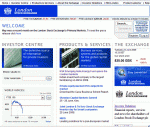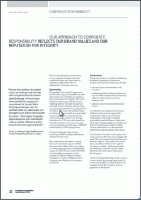Embedded within the human race’s shared psyche there is one memory every child has: the wagging finger and stern expression of an elder scolding you for your latest transgression.
Along with it is one of those hallelujah moments which act as milestones on the path from child to adulthood: the realisation that elders aren’t actually supreme beings who are wholly infallible.
With this comes further understanding that rules can be broken with justification but that it’s all too easy to slip into hypocrisy, which in turn leads directly to a lack of credibility from which it is difficult to recover.
The London Stock Exchange is such an elder organisation, its remit being to police how company ownership is traded on all London’s stock markets.
However if London is to move forwards as a centre of sustainability it needs to examine its own performance in this area, lest its current failings lead companies to look elsewhere for a suitable base in the future.
Powers to be Undermined
As an example of the London Stock Exchange’s powers, on the 19th June 2008, Meridian Petroleum was publicly censured and fined £75,000. The company trades on the AIM and currently has a £1.2m turnover against a £1.7m loss.
The reason for this action was because Meridian failed to properly disclose information regarding some of its oil fields.
This in turn led to investors having an incorrect understanding of the company’s assets thus creating a false picture of the level of risk any investment would have represented.
It would be difficult to take the censuring body, the London Stock Exchange, particularly seriously if it itself was known to be particularly opaque about its own assets.
Which means it’s just as well sustainability issues aren’t part of its regulatory remit otherwise London could find itself the focus of international derision.
Follow the Trail Already Blazed
Navigating to the sustainability section of the London Stock Exchange website is not the most straightforward of tasks.
It’s tucked away as part of the Company Overview. This itself is not immediately obvious, being linked to from either free text from within the Investor Relations mini-site, or a heading in the “About The Exchange” section.
The impression this gives is of a haphazardly put together website, an impression which isn’t dispelled once the sustainability section is tracked down.
A terse couple of paragraphs tells the visitor how important integrity is to the company running the trading of the world’s most international stock market.
This is followed by links to further content for Governance, Employees, Community and Environment. Only one of these links works, but luckily they’re provided on the left bar navigation menu as well.
Each of these sections outlines the basic steps the company is engaged in. There is no depth to the discussion and only a brief environmental policy is posted.
Crucially there is no data, either on the website or within the company’s annual report. This makes it impossible for analysts or commentators to measure or gauge the company’s commitment.
Often in cases like this, the shortfall in measurable data in filled with presumption based upon the company’s presentation of this lack of information. As outlined above, the London Stock Exchange’s presentation is not good.
Look to the Future
London is rightly proud of its place as one of the major stock trading hubs of the World. Successive governments have regulated to keep it beyond reproach, while liberalised to allow the market to flourish.
However the mood is starting to change away from pure capitalism. Just a few days after the censure of Meridian Petroleum the World Economic Forum called on governments to stimulate a “Green Industrial Revolution”.
As this mood translates into an actual change in approach companies will look to see which markets can best support the sustainable method of doing business.
Anyone looking at the London Stock Exchange’s website would realise they are behind the game in simple presentation and seemingly haphazard in their ability to put the pieces together.
This needs to change if the market is to continue in its position of strength in the long term.
A former CTO, Chris has a broad and varied background. He’s been involved with blue chips, consultancies & SMEs across a wide variety of sectors and has worked in Europe, the Middle East and Australia.
In 2007 he decided to combine his knowledge of business and IT with his passion for all things sustainable and has been busy writing ever since. However, his greatest ambition remains to brew the perfect cup of coffee.


